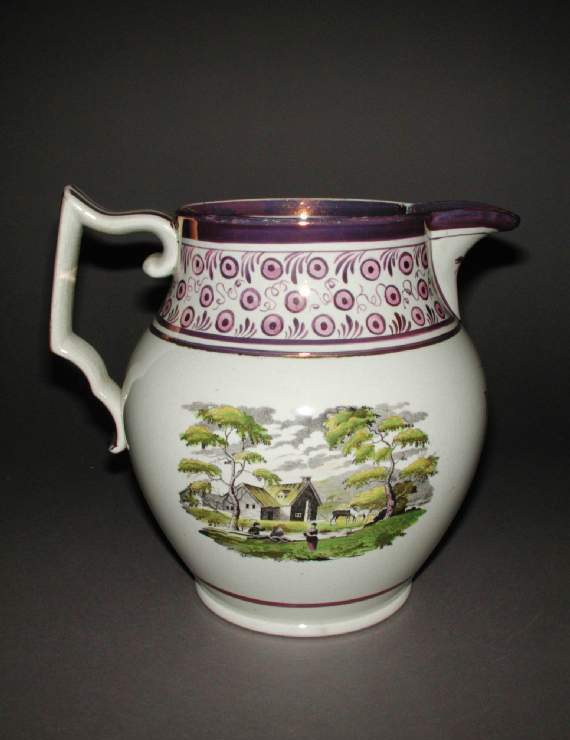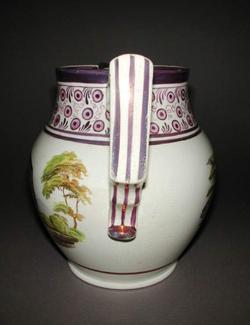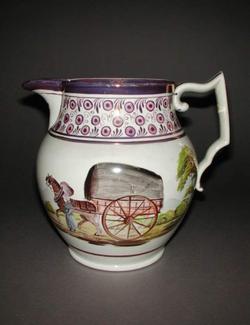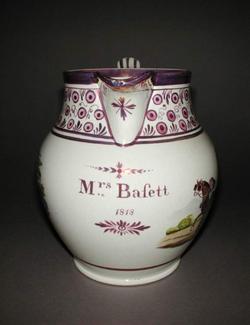Current Location: In storage
Titles
Mrs Basett jug
Maker(s)
Pottery:
Unidentified factory
(Probably)
Entities
Categories
Description
White earthenware, lead-glazed, transfer-printed and painted with enamels and pink lustre.
Ovoid body tapering slightly to a projecting foot, with curved neck, curved spout and an angular handle. Decorated on one side with a two-wheeled carrier’s cart led by a woman, painted partly under-glaze and finished with enamels, and on the other with a stippled transfer print of a rural scene of a house and two trees beside a river, with horses and figures, which is over-painted in green and pink enamels. Under the spout the inscription ‘Mrs Basett / 1818’, in pink lustre. The rim is lined with pink lustre. On the neck is a border of stylised berries and foliage in pink lustre, the berries filled with a paler pink lustre and a central dot, above two thin lustre bands on the shoulder. There are further lustre lines above the foot and outlining the spout, and three running down the handle and a star-like motif under the lip . The underside is flat and glazed, with a raised foot-rim.
Notes
History note: Bought by Dr Glaisher, Trinity College, Cambridge from Miss Freeman, shop in the Broadway, St Ives, Hunts., on September 26 1905 for £1.
Legal notes
Dr J.W.L. Glaisher Bequest
Measurements and weight
Height: 21 cm
Width: 22 cm
Acquisition and important dates
Method of acquisition: Bequeathed
(1928)
by
Glaisher, J. W. L., Dr
Dating
19th Century, Early
George III
Production date:
AD 1818
Note
Early 19th-Century metallic lustres were produced by painting a thin layer of metal solution over the glaze and firing at a low temperature. Platinum was used to imitate silver and gold used in different concentrations or solutions, or over different coloured clays or slips, produced a range of colours from pink to copper. Known from early Middle Eastern, Moorish and Italian pottery, lustre was introduced in England by John Hammond, at Spode, c.1805. In 1810, Peter Warburton at New Hall pottery patented a method of lustre transfer printing, which is perhaps used here for the inscription.
The shape of this jug and the style of lustre lining suggest it may have been made in Staffordshire, though the technique was also popular in other regions. Potteries in Sunderland and Tyneside became known for combining lustre decoration with hand-painted transfer-prints which feature designs, verses and mottos, often with local or topical relevance.
Components of the work
Decoration
composed of
enamel
( greens, browns, grey, black, blue, pink)
lustre
( pink)
Materials used in production
Lead-glaze
Earthenware
Techniques used in production
Moulding
Throwing
Inscription or legends present
- Text: Mrs Basett / 1818
- Method of creation: Pink lustre, painted or transfer printed
- Type: Inscription
- Text: No.2365. Large jug with pink lustre decn. around neck and the inscription Mrs Basett 1918. Painted views at the sides. b. at S Ives ( Hunts. ) Sept 26 1905
- Method of creation: Rectangular paper label, handwritten in black ink
- Type: Label
References and bibliographic entries
Identification numbers
Accession number: C.1142-1928
Primary reference Number: 71407
Old object number: 2365
Stable URI
Audit data
Created: Saturday 6 August 2011
Updated: Tuesday 30 April 2024
Last processed: Tuesday 15 July 2025
Associated departments & institutions
Owner or interested party:
The Fitzwilliam Museum
Associated department:
Applied Arts







